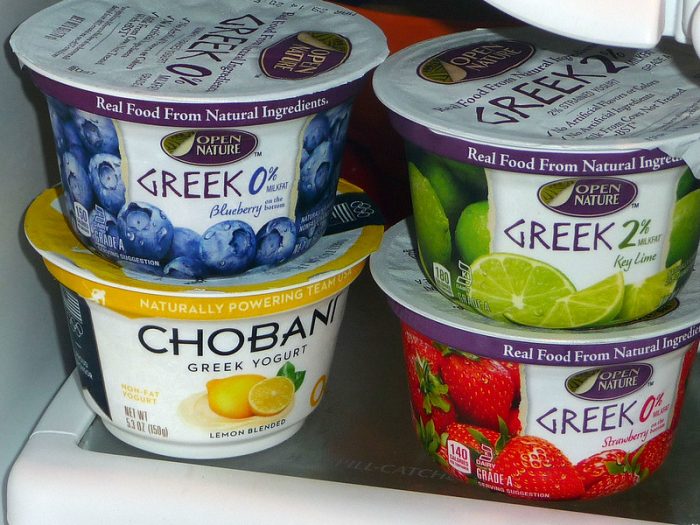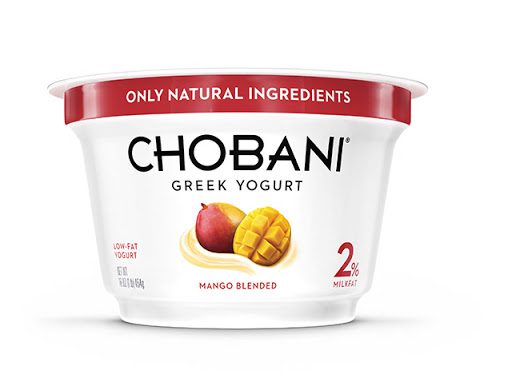Whether you’re a new parent or you’ve been one for a while, your need for reliable information regarding what’s good and not so good for your family is the same. Recently, there’s been somewhat of a hype surrounding Greek yogurt. What do you need to know about Greek yogurt? Understanding the benefits and potential risks of introducing yogurt into your baby’s diet is essential for their overall health and well-being.

Babies And Greek Yogurt
Let’s start by saying that this is a good food to give your baby. You should ensure that you’re serving the best kind for your child, though. You need to also introduce it at the right time.
It has some very good benefits for babies, even more so than regular ones with fresh fruit. One of the advantages is it’s easier to digest than other milk. Unsweetened Greek yogurt is still made with milk, but there is a higher level of straining during production. The extra straining reduces the level of lactose in it. For many babies, that is a big plus because it allows their systems to break down easier for digestion.

Your baby will also be getting around double the amount of protein from this one than what’s in other types of milk. Babies need protein to help their bodies grow. It provides a whole slew of nutritional value that helps with cell renewal, hormone balances, enzyme health, and even energy supply.
Is This Good For Babies?
By now, it should already be evident that the answer to this question is yes, Greek yogurt is good for babies. But there’s more to it than that.
- Start by offering plain yogurt instead of flavored varieties, as flavored ones typically contain more sugar. Opting for plain yogurt usually means less added sugar.
- Enhance the flavor by mixing in different purées. Creamy Greek yogurt pairs well with puréed apples, bananas, or even vegetables like sweet potatoes or carrots, offering both taste and nutrition.

When Can Baby Eat Greek Yogurt?
Your baby can start eating it when you start introducing solid foods. It’s best to serve it as the only new food at that time. That’s how you should introduce any new food. For instance, if your baby hasn’t had blueberries or milk, don’t mix puréed blueberries into the plain one because if there is a reaction, you won’t know which of the two new foods your baby’s body is reacting to. Remember as well that there are different Greek yogurt brands.
- Can 5-Month-Old Eat Greek Yogurt? The guideline for giving your baby yoghurt is to introduce it when you’re starting solid foods. That being said, different parents start solid foods at different times. If you’ve talked it over with the pediatrician, then plain one as a first food is ok. The biggest concern for such a young baby is potential allergic reactions or lactose intolerance.
- Can I Give It To My 7-Month-Old? Baby yogurt vs regular yogurt? Again, you should talk it over with your pediatrician, but if you’re moving into solid foods, many pediatricians will advise that milkone is a great first food. A 7-month-old baby is very close in age to the most highly recommended age for introducing milk. You need to be careful as well as there are different kinds of milk yogurt. You may encounter whole milk Greek type of yogurt and whole creamy yogurt. It is great to read the label first.

When Should I Give My Baby Yogurt?
Pediatricians most often recommend giving babies milk plain yogurt at 8 months old. Recommendations are based on when a baby’s digestive system has developed enough to handle the essential vitamins, minerals, lactobacillus acidophilus, and proteins found in the yogurt. You can start with a baby yogurt product that’s specially formulated to be easy on your baby’s system, too.
What Kind of Yogurt Is Good for Babies?
- Plain yogurt, considered the best yogurt for a 6-month-old baby, offers a good source of protein with lower amounts of sugar and lactose.
- Greek-style yogurt, similar to plain yogurt, is also recommended. It’s easier for a baby’s digestive system to break down, and its smooth, creamy texture is likely to be well-received.
- Consider organic Greek yogurt as it shares similarities with organic milk, offering additional health benefits.
- As babies grow older, you can introduce various fruits and vegetables into yogurt to add flavor and variety to their diet. However, avoid adding honey until your baby is at least 12 months old to reduce the risk of botulism, as recommended by pediatricians.

Can I Give My Baby Nonfat Type?
Babies need the fat found in full-fat dairy products. Before the age of two, it’s better if you stay away from the non-fat or low-fat versions of yogurt. There are nice brands of nonfat types of yogurt available on the market. Their bodies use the fat for their rapid growth and development. In the beginning, stick to the full-fat variety of Greek yogurt for your baby which has low grams of protein added as well.
Can Baby Eat Yogurt Every Day?
Babies can eat it every day. In fact, research shows that babies who eat yogurt regularly have fewer allergies and far fewer occurrences of eczema. Multiple studies have shown that the more regularly a baby is fed this type of food, the less likely it is it will develop food sensitivities or experience infectious diarrhea.
Does Greek Yogurt Constipate Babies?
Constipation is a common problem parents face with their babies. Greek type doesn’t have to be a part of that problem, though. Give your baby the type with probiotics in it to help combat this issue. Further, low-fiber foods can easily lead to constipation. You can add fiber to the yoghurt before serving it to your baby, either with an approved fiber powder or with fruits and vegetables.

Why Can Babies Consume It But Not Milk?
Most parents are aware that it’s recommended their babies not have cow milk until they reach age one. But why, then, are they able to have milk-based products, such as yoghurt?
- The American Academy of Pediatrics recommends that parents should give infants yoghurt because it has benefits like proteins that are easy for the digestive system to break down, probiotics that help with intestinal health, and other properties which fight skin conditions.
- Cow milk is much more difficult for a baby’s digestive tract to break down. It has more lactose and could lead to discomfort and more serious issues for your baby.

Let Your Baby Benefit from Greek Yogurt
There are great several health benefits for your baby from eating Greek yogurt. You just need to introduce it at the right time and in the right way. Then you can feel good knowing you’ve decided for your little one that will benefit them throughout their whole life.
Greek Yogurt FAQs:
1. What Is The Difference Between Greek Type and Regular yogurt?
Regular yogurt and Greek yogurt, both fermented dairy products, have notable differences.
- Greek yogurt, also known as strained yogurt, is thicker and tangier due to the removal of excess whey and liquids. It’s perfect for both sweet and savory recipes, often unsweetened.
- Regular yogurt has a creamier consistency with slightly lower acidity, made by fermenting milk with beneficial bacteria.
2. Is Eating Greek Yogurt Every Day, OK?
Consuming unsweetened Greek yogurt into your daily diet can be beneficial. Rich in milk protein concentrate and live active yogurt cultures, it supports a healthy body weight. Enjoying one to two cups daily provides a nutritious option without contributing to weight gain. However, consuming larger quantities may lead to excess calorie intake and potential weight increase.
3. What Are The Benefits Of Yogurt?
- Full-fat Greek yogurt: Probiotic-rich, promotes healthy body composition.
- Supports bone and gut health due to fermented milk content.
- Whether organic or low-fat, Greek yogurt is a protein powerhouse aiding in weight management while offering deliciousness.
4. Does Greek Yogurt Burn Belly Fat?
Although it offers benefits like bone health support and protein richness, it doesn’t directly burn belly fat or extra calories. Nonetheless, its consumption may contribute to weight management and boost metabolism.
5. When Should You Eat Greek Style Yogurt?
Greek yogurt that supports bone health and gut health can be eaten in the morning.
6. Can I drink Water After Eating Yogurt?
Drinking water after eating yogurt is beneficial, as it adds to its other health benefits. On the other hand, avoid consuming yogurt with milk, whether it’s whole milk or goat milk, as it may upset the stomach.
7. What Should Not Be Eaten With Yogurt?
- Avoid pairing yogurt with fish, melons, sour fruits, bananas, cheese, starches, goat milk, whole milk, or any other type of milk.
- The best yogurt for babies 6 months old is plain, unsweetened, and devoid of any additional tastes or colors.
- Before introducing yogurt or any new item to your baby’s diet, consult with your pediatrician for guidance.
8. What Is The Healthiest Yogurt?
Among the healthiest Greek yogurt found in the dairy aisle of your local foods market are Kite Hill Greek-Style Artisan Almond Milk Yogurt, Fage Fat-Free Greek Yogurt, Oikos Triple Zero Vanilla Greek Yogurt, Icelandic skyr, and Siggi’s Strained Yoghurt. These often displayed near olive oil, have low fat content and offer protein levels similar to those found in milk-based proteins.
9. What Is Greek Yogurt Good For?
Greek yogurt is good for various purposes, including its role as a nutritious and versatile food option. It is packed with protein, calcium, and probiotics, which support gut health and digestion. You can enjoy it on its own or use it as a base for smoothies, dips, and dressings. Greek yogurt is available in various flavors, such as key lime, which can be found at stores like Whole Foods. One example of a delicious and healthy option is Wallaby Organic Greek Yogurt. With its creamy texture and numerous health benefits, Greek yogurt is a popular choice for those looking to incorporate more nutritious options into their diet.
10. What Type Of Greek Yogurt Is Healthiest?
The healthiest type of Greek type of yogurt is one that is ultra creamy, protein-packed, and contains minimal added sugars. It should also be rich in essential nutrients, such as calcium and probiotics, which contribute to overall health and well-being. When selecting Greek yogurt, opt for brands that prioritize natural ingredients and focus on providing a nutritious and delicious product without relying on excessive sweeteners or artificial additives. By choosing this type of Greek yogurt, you can enjoy a satisfying and healthy snack or meal addition.
11. Which Greek Yogurt Is The Healthiest?
Determining the “healthiest” depends on individual dietary needs and preferences. However, here are some factors to consider when choosing one:
- Plain, unsweetened: Opting for plain one without added sugars is generally a healthier choice. Many flavored ones can contain high amounts of added sugars, which can contribute to excess calorie intake and potential negative health effects. Choosing a plain one allows you to control the sweetness and add your own toppings or fruits if desired.
- Probiotics: They contain live and active cultures, including specific strains of beneficial bacteria known as probiotics, which can be beneficial for gut health. Look for ones that mention the presence of live cultures or specific probiotic strains on the label.
- Low-fat or non-fat options: If you’re concerned about your fat intake, selecting dv pantothenic acid, low-fat, or non-fat yogurt varieties can be a healthier choice. However, it’s important to note that fat can contribute to satiety and may help you absorb certain fat-soluble vitamins, so everyone doesn’t need to choose low-fat options.
- Protein content: Greek Yogurt that is higher in protein can help keep you feeling fuller for longer and can be beneficial for muscle recovery and growth. Greek yogurt, for example, tends to have a higher protein content than regular one.
- Calcium: It is a good source of calcium, which is essential for bone health. Look for other yogurts that provide a significant amount of calcium per serving.
- Avoiding artificial additives: Some may contain artificial sweeteners, flavors, or preservatives. Choosing one with minimal or no artificial additives can be a healthier choice.
It’s always a good idea to read the nutrition labels and ingredients list when choosing yogurt to make an informed decision. Consider your dietary needs, such as any specific health conditions or dietary restrictions you may have, and consult with a healthcare professional or registered dietitian for personalized recommendations.
12. Is Milk Greek Yogurt Better Than Milk?
Whether Greek yogurt is “better” than milk depends on your specific dietary needs and preferences. Here are some factors to consider:
- Protein content: It typically contains more protein than milk. While milk contains about 8 grams of protein per cup, it can provide around 15-20 grams of protein per cup. Protein is essential for building and repairing tissues, supporting muscle growth, and promoting satiety.
- Fat content: The fat content can vary between different types of milk. Whole milk contains a higher fat content compared to low-fat or skim milk. Greek yogurt is available in various fat percentages, including whole, low-fat, and non-fat options. If you’re looking to reduce your fat intake, choosing a lower fat percentage or milk can be beneficial.
- Calcium: Both milk and Greek yogurt are good sources of calcium, which is important for maintaining strong bones and teeth. However, milk generally contains more calcium per serving compared to the other one. One cup of milk provides about 300 milligrams of calcium, while the other one typically contains around 150-200 milligrams of calcium per cup.
- Probiotics: It often contains live and active cultures, including beneficial bacteria called probiotics. These probiotics can promote gut health and aid digestion. While milk doesn’t naturally contain probiotics, some brands may fortify milk with them.
- Lactose intolerance: If you are lactose intolerant, you may find yoghurt easier to digest than milk. It has lower lactose content due to the straining process it undergoes, which removes some of the lactose-containing liquid whey.
13. How Do You Eat Plain Greek Yogurt?
Greek yogurt can be enjoyed in various ways. Here are a few common ways to enjoy it:
- As it is: Greek yogurt can be consumed directly from the container as a quick and convenient snack. It has a rich and creamy texture, making it enjoyable on its own.
- Topping for fruits: It pairs well with fresh fruits like berries, bananas, or sliced peaches. You can spoon it over the fruit or create layers by alternating fruit and yogurt in a bowl or glass.
- Breakfast bowl: Create a nutritious and satisfying filling breakfast bowl by adding toppings to it. You can sprinkle it with granola, chopped nuts, chia seeds, or flaxseeds for added crunch and nutritional value. Drizzle honey or maple syrup for a touch of sweetness if desired.
- Smoothies: It can be blended into smoothies to add creaminess and protein. Combine it with your favorite fruits, a liquid base (such as milk or juice), and any additional ingredients like spinach, peanut butter, or cocoa powder for a delicious and filling smoothie.
- Salad dressing: It can be used as a base for making creamy dressings. Simply mix it with herbs, spices, lemon juice, or vinegar to create a flavorful dressing for salads or as a dip for vegetables.
- Baking ingredient: It can be used in baking recipes as a substitute for other ingredients like butter, oil, or sour cream. It adds moisture and richness to baked goods like muffins, cakes, and bread.
Remember that It can also be used in savory dishes, such as marinades or sauces, to add tanginess and creaminess. Experiment with different flavors and combinations to find your preferred way of enjoying it.
14. What Does Greek Yogurt Taste Like?
Greek yogurt has a distinct taste compared to regular one. Here are some characteristics of the taste of it:
- Creamy and Thick: It has a thick and creamy texture, which contributes to its popularity. The thickness comes from straining out the whey, resulting in a more concentrated one.
- Tangy and Tart: Greek yogurt typically has a tangy and slightly sour taste. This tanginess is a result of the fermentation process, which produces lactic acid.
- Mildly Sweet: While it is generally tangy, some brands may have a slightly sweet taste. However, if you choose a plain one without any added sugars or flavorings, it will have a more neutral taste.
- Rich and Velvety: It often has a richer and more indulgent mouthfeel compared to regular yoghurt. It can feel velvety and satisfying on the palate.
- Subtle Nutty Flavor: Some individuals also describe this one as having a subtle nutty flavor, which adds another layer of complexity to its taste profile.
Overall, it has a unique taste that distinguishes it from other varieties. The exact flavor can vary slightly depending on the brand and the specific processing methods used.
15. Can I Eat Greek Yogurt On Empty Stomach?
When it comes to determining the healthiest one, there are a few factors to consider. Here are some guidelines to help you make a nutritious choice:
- Plain or Greek Yogurt: Opting for plain or Greek one without added sugars is generally a healthier choice compared to flavored or sweetened varieties. These options are lower in added sugars and provide a good source of protein, calcium, and probiotics.
- Low-Fat or Non-Fat Varieties: If you’re watching your calorie and fat intake, you may prefer low-fat or non-fat yoghurt. However, it’s important to note that full-fat yoghurt can still be a healthy option, especially if it comes from quality sources.
- Probiotics: Look for those that contain live and active cultures, as these can help support digestive health and boost the immune system. Some brands may specifically mention the presence of probiotics on the packaging.
- Minimal Ingredients: Check the ingredient list and choose yoghurt with a simple composition. Avoid products with excessive additives, artificial sweeteners, or high-fructose corn syrup.
- Organic and Grass-Fed: Consider opting for organic or varieties made from milk sourced from grass-fed cows. These options may have higher nutrient content and be free from synthetic hormones or antibiotics.
It’s important to note that individual dietary needs and preferences may vary, so it’s always a good idea to consult with a healthcare professional or a registered dietitian to determine which best suits your specific requirements.
Other Resources
Here are other good reads about babies and greek yogurt:
https://www.healthline.com/health/parenting/can-babies-have-yogurt#greek-yogurt
https://www.yummytoddlerfood.com/best-yogurt-for-toddlers/
https://babyfoode.com/blog/best-organic-yogurt-for-baby/
Last Updated on May 9, 2023 by Rejie Salazar
DISCLAIMER (IMPORTANT): This information (including all text, images, audio, or other formats on FamilyHype.com) is not intended to be a substitute for informed professional advice, diagnosis, endorsement or treatment. You should not take any action or avoid taking action without consulting a qualified professional. Always seek the advice of your physician or other qualified health provider with any questions about medical conditions. Do not disregard professional medical advice or delay seeking advice or treatment because of something you have read here a FamilyHype.com.